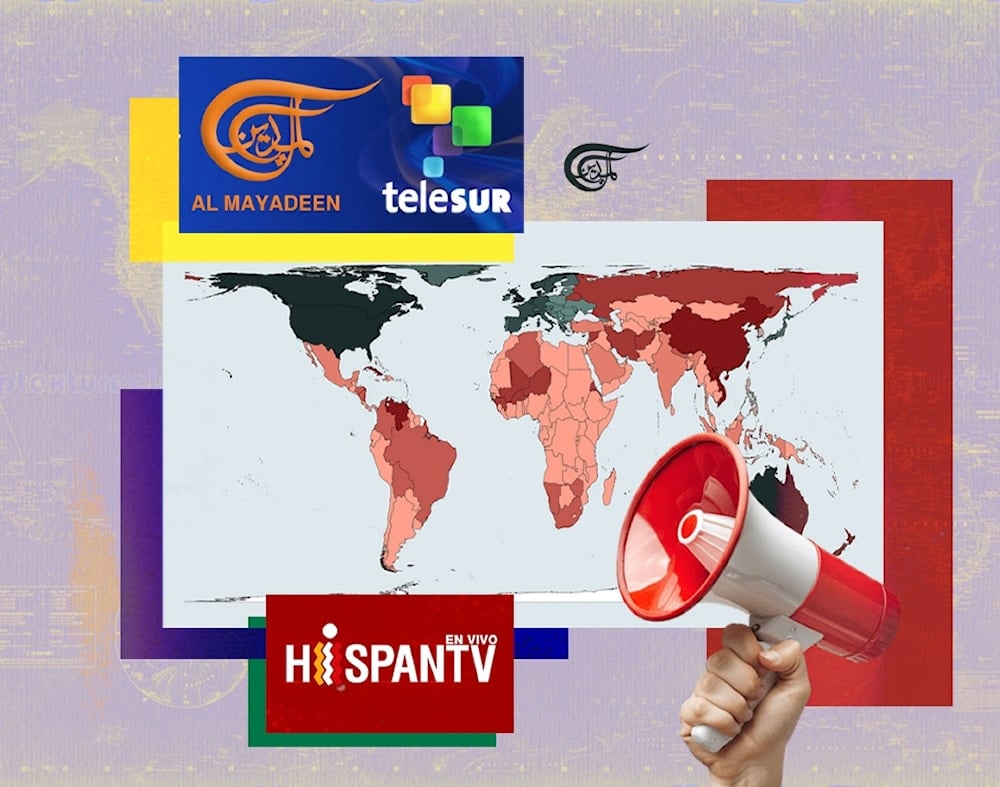Global South cooperation needed to counter hegemonic disinformation
Tim Anderson argues that Anglo-American powers sustain global dominance through vast propaganda networks. To counter this, he calls for a unified Global South media front, linking Latin America, West Asia, Africa, and Asia, to build independent, truth-based communication.
-

Combined media networks can strengthen voices on existing priorities while drawing attention to neglected issues. (Al Mayadeen English; Illustrated by Zeinab el-Hajj)
Systematic disinformation is employed by the hegemonic powers to destabilise, divide, and weaken independent peoples and nations. It serves to disempower entire populations, justify suffocating sieges, proxy wars, invasions, and occupations, and to disqualify resistance.
The problem: hegemonic propaganda is broad, deep, and well integrated.
The Anglo-American enemy has lost its advantages in technology, industry and commerce, but maintains them in finance and propaganda.
The dollar/SWIFT dictatorship still rules, and media, communicational, and ideological Anglo-American hegemony remains firmly in place, through well-developed networks.
These networks begin with
- A well-developed colonial media chain,
- Search engines which redirect honest questions to dishonest sources,
- Wikipedia and imperial AI,
- Heavily controlled US social media, and
- Paid media 'activists' (now temporarily disadvantaged by the dismantling of USAID and the NED)
The new range of Western fact checkers – with selective inputs and hidden programming – now actively collaborate to promote fake news, especially on important international controversies.
The problem is wider than particular misinformation, although Russia is setting up its own “fact checkers”. China has similar problems, but its first priority has to do with lies about China. This is entirely natural and legitimate.
Russia is concerned about the lies spread about Russia
China is concerned about the lies spread about China
Venezuela is concerned about the lies spread about Venezuela
Cuba is concerned about the lies spread about Cuba, and so on.
However, these are common problems and, in face of such common problems, as the Cuban national hero José Marti wrote, 236 years ago:
“The trees must form ranks to keep the giant with seven-league boots from passing! It is the time of mobilization, of marching together, and we must go forward in close ranks, like silver in the veins of the Andes.”
We should not pay so much attention to imperial propaganda, but we cannot just ignore it as, at times, it contains important admissions and revelations.
But how can we best read it? This is a pedagogical challenge, skills are needed for the identification, selection, and reading of permanent bias. All this requires some training in media method and forensic skills.
Importantly, an expansion of the platforms hosting authentic voices is necessary. There is a great need for partnerships between those with capacity and skill, to multiply counter hegemonic voices.
Some good precedents are:
- Telesur, a 20-year-old continental television network, in Spanish and English, but dominated by Latin American voices;
- HispanTV, an Iranian media channel which makes use of Hispanic reporters, and
- Al Mayadeen, an Arabic channel with Latin American partners and English and Spanish websites.
These should be seen as the beginnings of cross continental ventures.
While there are already links between West Asian media and Latin American agencies like Prensa Latina and Telesur, there is a need for large joint ventures, bringing in the BRICS heavyweights, for example
- Why not joint ventures between Russia’s RT and China’s CGTN?
- Why not more joint ventures with the Iranian media, the strongest in West Asia?
- Why not build joint ventures with the most capable of the African and SE Asian media bodies?
There are already discussions, including dozens of BRICS countries, to build a ‘Global South Media Cooperation Initiative’, launched on the margins of the G20 Summit in Rio de Janeiro at an event organised by China Media Group (CMG), specifically to amplify the voice of the Global South.
Combined media networks can strengthen voices on existing priorities while drawing attention to neglected issues. For example, the Iranian media pays attention to the struggles of the Yemeni people, who are ignored in most of the world. The Chinese, Russian, and Cuban media have their own special concerns and priorities, which are often neglected elsewhere.
The Global South already has some such links, sharing information and providing some mutual assistance. But we are not yet moving “forward in close ranks”, as was suggested by the Cuban national hero José Marti. And that is why the Anglo-Americans still dominate the world of propaganda.

 Tim Anderson
Tim Anderson
 4 Min Read
4 Min Read











